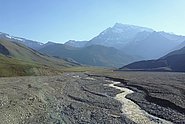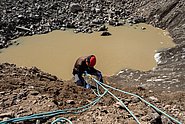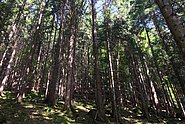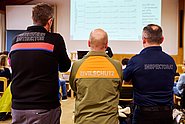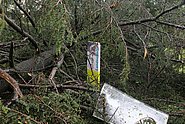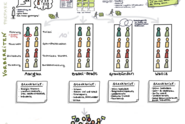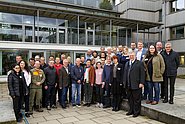
WSL Extremes Research Program: Building Resilience for an Uncertain Future ¶
Contents ¶
Driven by globalization and climate change, extreme events are becoming more frequent and severe. While some impacts can be anticipated, many consequences for the environment and society remain unclear. How can we prepare for events for which we have no precedent? This is the challenge the WSL Extremes Research Program aims to meet.
Switzerland has already experienced the dramatic impacts of single or interacting drivers of climate change in recent years; the drought and heatwave of summer 2018 was one of the most severe in decades, with significant consequences for agriculture, water supply, energy production, and natural ecosystems. As climate change continues to exert its effects, extreme events such as drought, heatwaves, storms, and flooding are likely to become part of our new normal.
These extreme events pose a unique problem for stakeholders and decision makers, since such conditions are unprecedented and there is therefore no experience on which to draw. In the face of this uncertainty, science is called upon to provide the knowledge and resources needed to meet the unpredictable challenges ahead.
Thinking the Unthinkable ¶
The WSL Extremes Research Program, which runs until the end of 2025, focuses on those rare and irregular events that can have a substantial impact on the environment and society. Traditional linear extrapolations of known drivers often fail to capture the complex mechanisms behind extreme events. Our approach focuses on understanding abrupt, compounded, or interacting changes in drivers, which frequently lead to non-linear and tipping-point behaviors. By thinking beyond the bounds of what has been experienced thus far – by reaching towards the unthinkable – we aim to help Switzerland prepare for extreme events with significant consequences.
The complexity of addressing extreme events requires a collective effort. The Extremes program’s five projects bring together scientists and stakeholders from various disciplines and sectors. Through this inter- and transdisciplinary collaboration, we are working to develop innovative tools, robust strategies, and concrete solutions to enhance Switzerland’s resilience in the face of future extremes.
Extremes Projects: Tackling Future Challenges ¶
WebApp EXtremes: What Will Switzerland’s Climate Look Like in Future? ¶
Climate scenarios show how the climate could develop on average. However, the average rarely reflects reality. It is the extreme events - significantly above or below this average - that have unforeseeable and sometimes irreversible consequences for the environment and society.
What does this mean for Switzerland, its mountains, forests, and agriculture? And for you?
It's complicated and it depends: What does extreme mean?
This website (in German) provides an insight into the effects of various climate scenarios for the next 20 years: how global warming is already noticeable today in exceptional cases, how it is predicted on average, and how it could manifest itself under extreme circumstances.
Join the Discussion ¶
We invite you to contribute to the WSL Extremes Research Program. Let's think together and help build a more resilient future for Switzerland under climate change. Contact us to be part of this vital conversation.
Want to stay updated on the latest news from the Extremes Program? Follow us on Bluesky!

Upcoming events ¶
Past Events ¶
Contact ¶
Steering Committee ¶
Publications ¶
Deutsch L., Björnsen A., Fischer A.M., Hama A.M., Zimmermann N.E., Zurbrügg C., Hoffmann S. (2025) Herding cats: integrative leadership strategies in inter- and transdisciplinary research programs. Sustain. Sci. 20, 95-115. doi:10.1007/s11625-024-01585-4 Institutional Repository DORA
Bont L.G., Blattert C., Rath L., Schweier J. (2024) Automatic detection of forest management units to optimally coordinate planning and operations in forest enterprises. J. Environ. Manag. 372, 123276 (15 pp.). doi:10.1016/j.jenvman.2024.123276 Institutional Repository DORA
Bont L., Blattert C., Schweier J., Bührle L., Helzel K., Bebi P., … Nikolova P.S. (2023) Mountain spruce forests as hotspots for EXtremes: optimal allocation of the limited resources of a forest enterprise. In WSL Berichte: Vol. 144. Forum für Wissen 2023. Eidg. Forschungsanstalt für Wald, Schnee und Landschaft WSL. Institutional Repository DORA
Bottero A., Zürcher S., Bebi P. (2023) Herausforderungen in Gebirgswäldern gemeinsam angehen: wie Forschung und Praxis erfolgreich zusammenarbeiten und voneinander profitieren können. In P. Bebi & J. Schweier (Eds.), WSL Berichte: Vol. 144. Aus Störungen und Extremereignissen im Wald lernen. Birmensdorf: Eidg. Forschungsanstalt für Wald, Schnee und Landschaft WSL. 61-65. doi:10.55419/wsl:35236 Institutional Repository DORA
Bottero A., Bührle L., Banzer T., Helzel K., Bast A., Hobi M., Bebi P. (2023) Störungsanfälligkeitskarten zur Priorisierung der Waldbewirtschaftung. Bündnerwald. 76(4), 46-49. Institutional Repository DORA
Chang A.Y.Y., Bogner K., Grams C.M., Monhart S., Domeisen D.I.V., Zappa M. (2023) Exploring the use of European weather regimes for improving user-relevant hydrological forecasts at the subseasonal scale in Switzerland. J. Hydrometeorol. 24(10), 1597-1617. doi:10.1175/JHM-D-21-0245.1 Institutional Repository DORA
Cremona A., Huss M., Landmann J.M., Borner J., Farinotti D. (2023) European heat waves 2022: contribution to extreme glacier melt in Switzerland inferred from automated ablation readings. Cryosphere. 17(5), 1895-1912. doi:10.5194/tc-17-1895-2023 Institutional Repository DORA
Glatthorn J., Schweier J., Streit K., Thees O., Hobi M. (2023) Adaptiver Waldbau - mit Wissen, Vorsicht und Mut. Schweiz. Z. Forstwes. 174(2), 64-69. doi:10.3188/szf.2023.0064 Institutional Repository DORA
Slater L.J., Arnal L., Boucher M.A., Chang A.Y.Y., Moulds S., Murphy C., … Zappa M. (2023) Hybrid forecasting: blending climate predictions with AI models. Hydrol. Earth Syst. Sci. 27(9), 1865-1889. doi:10.5194/hess-27-1865-2023 Institutional Repository DORA
Temperli C., Nikolova P., Brang P. (2023) Zukunftsfähigkeit der Baumartenzusammensetzung des Schweizer Waldes. Schweiz. Z. Forstwes. 174(2), 76-84. doi:10.3188/szf.2023.0076 Institutional Repository DORA
Bebi P., Schweier J. (Eds.) (2023) Aus Störungen und Extremereignissen im Wald lernen. WSL Berichte: Vol. 144. Forum für Wissen 2023Birmensdorf: Eidg. Forschungsanstalt für Wald, Schnee und Landschaft WSL. 65 p. doi:10.55419/wsl:35217 Institutional Repository DORA
Bogner K., Chang A.Y.Y., Bernhard L., Zappa M., Monhart S., Spirig C. (2022) Tercile forecasts for extending the horizon of skillful hydrological predictions. J. Hydrometeorol. 23(4), 521-539. doi:10.1175/JHM-D-21-0020.1 Institutional Repository DORA
Bolliger J., Collet M., Hohl M., Obrist M.K. (2020) Automated flight-interception traps for interval sampling of insects. PLoS One. 15(7), e0229476 (8 pp.). doi:10.1371/journal.pone.0229476 Institutional Repository DORA
Bolliger J., Hennet T., Wermelinger B., Bösch R., Pazur R., Blum S., … Obrist M.K. (2020) Effects of traffic-regulated street lighting on nocturnal insect abundance and bat activity. Basic Appl. Ecol. 47, 44-56. doi:10.1016/j.baae.2020.06.003 Institutional Repository DORA
Bolliger J., Hennet T., Wermelinger B., Blum S., Haller J., Obrist M.K. (2020) Low impact of two LED colors on nocturnal insect abundance and bat activity in a peri-urban environment. J. Insect Conserv. 24(4), 625-635. doi:10.1007/s10841-020-00235-1 Institutional Repository DORA
Bolliger J., Haller J. (2019) planBAR? Smart light - bei grosser Planung auch das Kleine sehen. Smart-light-Technologie: Chancen und Herausforderungen für die Biodiversität. In A. Björnsen Gurung (Ed.), WSL Berichte: Vol. 84. Schweiz erneuerbar!. Birmensdorf: Eidg. Forschungsanstalt für Wald, Schnee und Landschaft. 11-14. doi:10.55419/wsl:21921 Institutional Repository DORA
Wartmann F.M., Mackaness W.A., Bauer N., Bolliger J., Kienast F. (2019) Towards an interdisciplinary understanding of landscape qualities: wilderness, tranquillity and dark skies. In L. Mueller & F. Eulenstein (Eds.), Innovations in landscape research. Current trends in landscape research. Cham: Springer. 191-220. doi:10.1007/978-3-030-30069-2_7 Institutional Repository DORA



